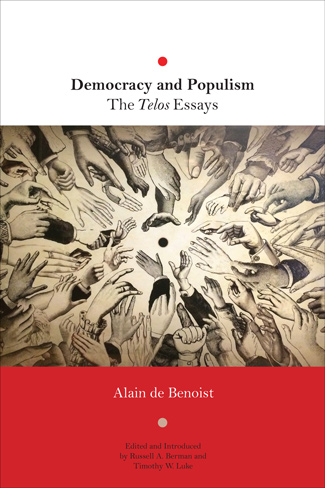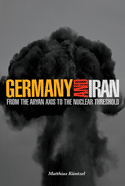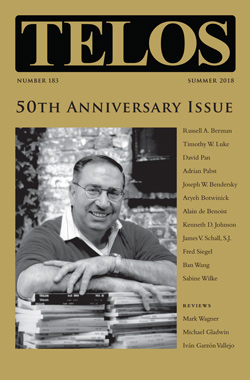By Paul Grenier · Friday, September 7, 2018 Are the divisions that fragment the United States primarily driven by some deep flaw in its political life, or was the United States doing just fine, thank you very much—until Russia came along during the 2016 presidential race and started sowing division and dissension?
Framed that way, the question answers itself. Whatever some state-sanctioned Russian actors may have done to pester the American political process, it is obvious that America’s deep divisions exist for reasons having essentially nothing to do with Russia. They long precede the last election.
Even if Russia’s interventions into American electoral politics turn out to be more significant than they presently appear, this cannot change the more fundamental reality that our confrontational posture, including vis-à-vis Russia, is by no means something external to the United States’ Lockean liberal political concept.
Continue reading →
By Telos Press · Saturday, September 1, 2018 New from Telos Press: Democracy and Populism: The Telos Essays, by Alain de Benoist. Edited by Russell A. Berman and Timothy W. Luke. Order your copy in our online store, and save 20% on the list price by using the coupon code BOOKS20 during the checkout process.
 The crisis of democracy, the consequences of neoliberalism and globalization, the limits of sovereignty, and of course the rise of populism: few thinkers have given more sustained attention to these matters than the French author Alain de Benoist. Democracy and Populism collects de Benoist’s essays from the journal Telos, where many of his writings first appeared in English translation. Reading de Benoist in Telos provides access to a distinctive transatlantic intellectual dialogue and to an array of prescient insights into the current political condition on both continents. De Benoist clearly anticipated today’s political condition: the critique of neoliberalism, the contradictions in liberalism created by the postcolonial frictions of identity politics, and the implications of a resurgent populism. The specific forms of populist movements are sure to vary in the coming years, but the crisis of liberal democracy will remain the defining feature of political life for the foreseeable future. De Benoist explains why. The crisis of democracy, the consequences of neoliberalism and globalization, the limits of sovereignty, and of course the rise of populism: few thinkers have given more sustained attention to these matters than the French author Alain de Benoist. Democracy and Populism collects de Benoist’s essays from the journal Telos, where many of his writings first appeared in English translation. Reading de Benoist in Telos provides access to a distinctive transatlantic intellectual dialogue and to an array of prescient insights into the current political condition on both continents. De Benoist clearly anticipated today’s political condition: the critique of neoliberalism, the contradictions in liberalism created by the postcolonial frictions of identity politics, and the implications of a resurgent populism. The specific forms of populist movements are sure to vary in the coming years, but the crisis of liberal democracy will remain the defining feature of political life for the foreseeable future. De Benoist explains why.
Continue reading →
By Telos Press · Friday, August 31, 2018 In a new opinion piece in the Jerusalem Post, Sean Durns discusses Matthias Küntzel’s Germany and Iran: From the Aryan Axis to the Nuclear Threshold, published by Telos Press. Pick up your copy of Germany and Iran in our online store, and save 20% with the coupon code BOOKS20.
 As the German historian Matthias Küntzel detailed in his 2014 book, Germany and Iran: From the Aryan Axis to the Nuclear Threshold, close ties between the two countries go back to the pre-World War I era. As the German historian Matthias Küntzel detailed in his 2014 book, Germany and Iran: From the Aryan Axis to the Nuclear Threshold, close ties between the two countries go back to the pre-World War I era.
In the late 19th century, Persian hopes for industrial development hinged on German know-how and technological prowess. After the ascension of Kaiser Wilhelm II in 1888, “economic relations between the two countries began to expand swiftly” and “it became fashionable for young Persian intellectuals to be pro-German,” Küntzel notes.
Continue reading →
By Telos Press · Friday, August 10, 2018 Telos 50th Anniversary Sale! To help celebrate the 50th anniversary of Telos, we are offering a 20% discount on individual subscriptions and books purchased through the Telos Press website! Just use the coupon code TELOS50 during the checkout process. Offer expires August 31, 2018.
Writing at City Journal, Fred Siegel reports on the lively conversations at the Telos 50th anniversary event, held in June in New York City. An excerpt:
 Describing the vibrant intellectual life of New York in the late 1940s and early 1950s, Anatole Broyard’s Kafka Was the Rage is one of my favorite books. “Alienated from alienation,” Broyard was fascinated by the lively parties where people debated so intensely that “we didn’t know where books ended and we began.” Describing the vibrant intellectual life of New York in the late 1940s and early 1950s, Anatole Broyard’s Kafka Was the Rage is one of my favorite books. “Alienated from alienation,” Broyard was fascinated by the lively parties where people debated so intensely that “we didn’t know where books ended and we began.”
Recently, I had the good fortune to attend such a gathering: a celebration held in honor of the 50th anniversary of Telos, the lively, unpredictable highbrow magazine founded in 1968 by Paul Piccone, then a graduate student in philosophy at the University of Buffalo. Piccone died in 2004, but Telos, unsubsidized by any university and unwilling to bend to any ideology, has continued as an independent journal under the talented tutelage of his widow, Mary, and the current editor, Russell Berman, who has written insightfully about the great German writer Ernst Jünger. Telos began as part of the New Left but later broke with all orthodoxy, publishing the Schmittians of the Left and Gramscians of the Right (referring to hard-Right 1930s German political philosopher Carl Schmitt and 1930s Italian Marxist Antonio Gramsci, both back in vogue today, but in unexpected places).
Continue reading →
By Ban Wang · Thursday, July 19, 2018 Ban Wang’s “Confucianism and Nature: Ecological Motifs in Kang Youwei’s Great Community” appears in Telos 183 (Summer 2018), our fiftieth anniversary issue. Read the full article at the Telos Online website, or purchase a print copy of the issue in our online store. Individual subscriptions to Telos are available in both print and online formats.
Environmental writers have been turning to Chinese traditions for a harmonious relation between humans and nature. However, treating environmental crises as a metaphysical meditation on how humanity as a whole stands over against nature ignores the critical examination of power relations in the equal relation of production, social hierarchy, and political oppression. As Max Horkheimer and Theodor Adorno declared, humanity’s domination of nature stems from the domination by some humans over others as well as over human nature. Environmental injustice is social injustice. From this immanent critique, Kang Youwei’s recapture of Confucian cosmology proves to be a critical resource. An influential thinker and reformer in the transition from the empire to a modern nation, Kang Youwei (1858–1927) wrote The Great World Community (Datong shu) and proposed to abolish all boundaries of nation-state, class, hierarchy, gender, and race, in hopes of bringing diverse peoples and nations into a cosmopolitan community. Ecological motifs could be recovered in Kang’s critique of oppressive social, political, and gender relations.
Continue reading →
By Timothy W. Luke · Wednesday, July 11, 2018 On June 8, 2018, Telos celebrated its fiftieth anniversary at a special event held in New York City. Speakers included Telos editors Russell Berman, Tim Luke, David Pan, and Adrian Pabst, as well as Jacob Siegel, who delivered a talk on “Telos, Post-liberal Politics, and a Veteran’s Reading of Ernst Jünger.” Videos of the event are available at the Telos-Paul Piccone Institute website. Telos 183 (Summer 2018), our fiftieth anniversary issue, is available for purchase in our store. Presented below is a transcript of Tim Luke’s remarks at the anniversary event.
To address the history of Telos, I will open this brief account tonight about the journal by recalling my history with Telos since 1975. As a new cadre in “the St. Louis TELOS group,” I began by unloading boxes of Telos 26 (Winter 1975–76) from a panel truck early on a Saturday morning during the winter break outside of McMillan Hall, where Paul Piccone and the Telos office were embedded in the Sociology Department of Washington University, St. Louis. Working then as what we call an “intern” today, I soon was translating “into” the American English various versions of different draft manuscripts. Many articles at that time came through the mail as pages of disorderly text that another individual, like the author or an associate, with some English skills translated “out of” Czech, German, Hungarian, Italian, or Polish into a global semi-Anglophonic creole.
Continue reading →
|
|





